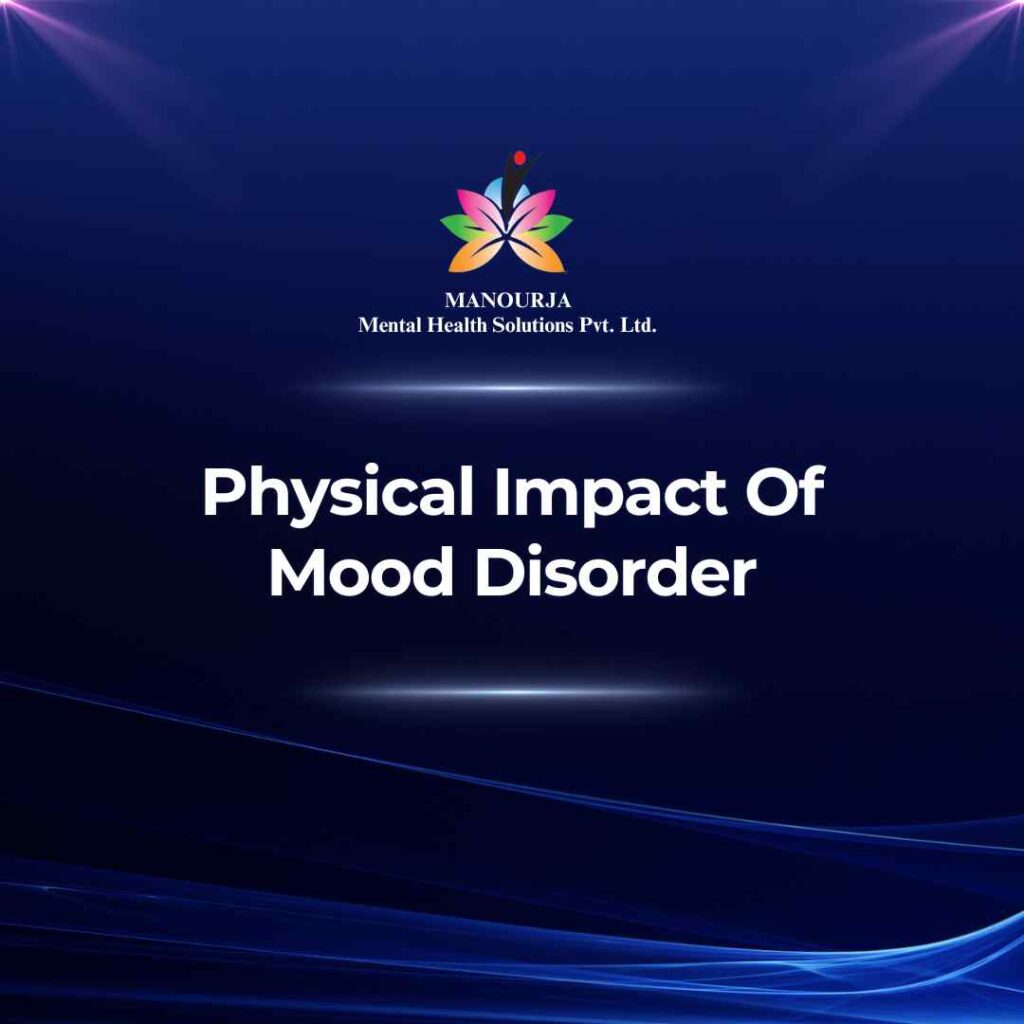Physical Impact of Mood Disorder

Mood disorders, such as depression and bipolar disorder, not only affect mental health but also have significant physical impacts. These effects can compromise overall health and worsen the quality of life.
Here’s a detailed look at some of the physical impacts of mood disorders:
Sleep Disturbances
One of the most common physical symptoms associated with mood disorders is disrupted sleep. Individuals may experience insomnia (difficulty falling asleep or staying asleep), hypersomnia (excessive sleepiness), or irregular sleep patterns. These disturbances can lead to fatigue and exacerbate other symptoms of the disorder.
Changes in Appetite and Weight
Mood disorders often lead to changes in appetite, which can result in significant weight loss or weight gain. Depression can cause decreased appetite and weight loss, whereas some individuals might experience increased cravings for food and weight gain. In bipolar disorder, these changes can vary depending on whether the person is in a depressive or manic phase.
Energy Levels
There is often a noticeable change in energy levels. Many people with mood disorders report feeling lethargic and fatigued; they may struggle to complete everyday activities that were once routine.
Physical Pain
Unexplained physical symptoms such as headaches, back pain, muscle aches, and stomach pain are common. This is sometimes referred to as somatization, where psychological distress manifests as physical symptoms.
Cardiovascular Health
Research has shown a link between mood disorders and increased risk of cardiovascular disease. Stress hormones, such as cortisol, can contribute to higher blood pressure and heart rate, increasing the risk of hypertension and heart disease.
Immune System Dysfunction
Chronic stress and mood disorders can affect the immune system, leading to decreased immune function. This can increase susceptibility to infections and may slow down healing or recovery from illness.
Neurological Impact
Mood disorders can affect cognitive functions, leading to impaired memory, decreased attention span, and slower processing speeds. These cognitive impairments can have a substantial impact on daily functioning.
Gastrointestinal Issues
Stress and anxiety associated with mood disorders can affect the gastrointestinal system. Symptoms can include nausea, diarrhea, constipation, or other digestive issues.
Endocrine and Hormonal Issues
Mood disorders can influence the production of hormones, disrupting endocrine functions. This can have wide-ranging effects, including issues with menstrual cycles, sexual dysfunction, or thyroid imbalances.
Addressing the physical impacts of mood disorders is crucial for comprehensive treatment. This often involves a combination of medication, therapy, lifestyle changes (such as diet, exercise, and sleep hygiene), and sometimes interventions like stress management techniques. Managing these physical symptoms can significantly improve treatment outcomes and overall well-being.
At MANOURJA, we believe in the transformative power of counseling. Our experienced therapists offer a safe and supportive space where you can explore your thoughts, emotions, and challenges. Through personalized counselling sessions, we’ll work together to develop coping strategies, build resilience, and achieve lasting positive change. Discover the path to a healthier, happier you with MANOURJA counselling services.
MANOURJA Rehabilitation Services
At MANOURJA, we’re dedicated to helping you in rebuild your life, after difficult times. Our rehabilitation services focus on understanding what you need to move forward, whether you’re recovering from addiction, trauma, or any psychological – social challenges. We create personalized plans, that are all about helping you, regain your strength and find hope again. With a caring team by your side, you’ll have the support to make real progress and take steps toward a brighter, healthier future.
